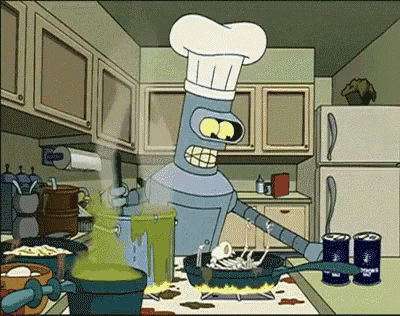Fuck that
Thank goodness my dumb kitchen will stay dumb, and this will not effect me
I still prefer my refrigerator with a stick shift.
Can I have LLMs block any headline that includes “the future” and “AI”? No? Then maybe, just maybe this trendy hype of AI actually helping people is pure bullshit…
Give me Rosie the robot and I might be interested in a smart kitchen.
You just want a sassy robot to tell you “no”
Tbh i prefer a robot that can be programmed to become chef rather than have kitchen appliances that has AI
Bc i don’t see any improvement in cooking with AI appliances compared to non AI other than high price & look luxurious & high techGod this is stupid. A robot chef? How is it a chef if it can’t taste the food it makes? If you don’t like, don’t have time, don’t know how to cook, just buy ready made food.

Here is an alternative Piped link(s):
https://m.piped.video/watch?v=yyse-BB-u9o
Piped is a privacy-respecting open-source alternative frontend to YouTube.
I’m open-source; check me out at GitHub.
This has the potential to be really cool if the software, including the AI, is local and open source, and the hardware is easily repairable.
Unless it can literally do all the cooking and clean the dishes, it ain’t worth it. I saw a video of one of these robot “chefs” where you had to preportion all the food into it, and then spend ages cleaning it out. At that point just make your own damn food.
This is the best summary I could come up with:
One of the earliest smart kitchen gadgets, this beautiful piece of tech was almost impossible to use because it relied entirely on an app and Wi-Fi connectivity.
Chris Young, former CEO of ChefSteps which developed Joule, told the SKS audience how the decision to not put a screen on the device lost them half their potential customer base.
This type of pivot is emblematic of what I saw throughout the conference this week: a refocusing by the entrepreneurs and companies in the smart kitchen away from sleek, showy gadgets toward developing products built on an understanding of how people actually cook.
Many of the solutions I saw and heard about seem designed to make cooking easier, healthier, and more personalized — the latter being something generative AI will clearly play a big role in.
My ideal smart kitchen is one that knows what I have in my pantry and fridge, can develop me a meal plan based on those ingredients, shop for whatever extra items I need, then have my appliances prepped and ready to go when I start cooking.
I’ll be sharing snippets and stories around the things that caught my attention at the Smart Kitchen Summit over the next few days, so check back often.
The original article contains 433 words, the summary contains 207 words. Saved 52%. I’m a bot and I’m open source!








